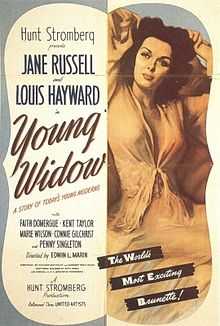Young Widow
| Young Widow | |
|---|---|
 Theatrical release poster | |
| Directed by | Edwin L. Marin |
| Produced by | Hunt Stromberg |
| Written by |
Clarissa Fairchild Cushman (novel) Richard Macaulay (writer) |
| Starring |
Jane Russell Louis Hayward |
| Music by | Carmen Dragon |
| Cinematography | Lee Garmes |
| Editing by | John M. Foley |
| Distributed by | Hunt Stromberg Productions |
| Release dates | March 4, 1946 |
| Running time | 100 minutes |
| Country | United States |
| Language | English |
Young Widow is a 1946 drama film directed by Edwin L. Marin, starring Jane Russell and Louis Hayward. It focuses on Joan Kenwood, a young journalist who can't get over her husband's death in World War II. Kenwood is reminded in large ways and small of her late husband during every one of her assignments.[1]
With The Outlaw still being withheld from general release, Young Widow represented the first time that most filmgoers ever saw a 25-year-old Jane Russell on the screen.
Plot
Set during WWII, journalist Joan Kenwood (Jane Russell), whose Air Corps photographer husband was killed on an air mission, returns to New York City from England. The managing editor of the newspaper for which she worked, Peter Waring (Kent Taylor), offers Joan work, but she despondently rejects it and instead stays with two aunts on their farm in Virginia. Unable to stop thinking about the death, however, she decides to return to New York.
On the train, young bomber pilot Lt. Jim Cameron (Louis Hayward) persistently tries to charm her, but Joan rebuffs him. In New York, both are unable to find vacant hotel rooms, but Joan calls her friend, Peg Martin (Penny Singleton), whose baseball player husband is serving on a submarine, for a place to stay. Peg shares her apartment with Mac (Marie Wilson), a show girl who has just returned from entertaining the troops. A number of military men drop in on the apartment as Joan arrives, all invited by the scatter-brained Mac. Jim learns where Joan is staying, shows up too, and sees opportunity in the situation. Later, everyone goes out to a café. While Jim and Joan are dancing, her husband’s favorite song is played, and a distraught Joan leaves. Jim follows and takes her home. When he bluntly suggests that she get over the man she is in love with, Joan explains that the man is her husband, who was killed over Berlin. Ashamed, Jim returns to his base at Mitchel Field on Long Island, where he is awaiting orders for the Pacific.
The next day, as Joan is leaving the apartment, she encounters a remorseful Jim. After she accepts his apology, Jim accompanies her to the subway. While waiting for the train, Jim saves the life of an elderly woman who falls on the tracks. Joan's reporter instincts take over, and she investigates the story and offers it to the paper. Delighted, Peter promptly puts her on the payroll. She and Jim pursue an easy-going courtship when he receives a 72-hour pass.
Jim receives a telegram ordering him to report for cholera shots. He proposes to Joan, but still haunted by her husband, she rejects him saying that "it will always be this way." A few days later, Peg’s husband returns after losing his leg in combat, and moved by seeing them together, Joan decides to tell Jim that she will wait for him. Peter drives her to the airfield, but Jim's outfit is already taking off. She waves frantically at him from outside the gate as he takes off, and as he passes by, mouths the words that she loves him and will wait for him.
Cast
|
|
References
External links
- Young Widow at the Internet Movie Database
- Young Widow at the TCM Movie Database
- Young Widow at allmovie
| |||||